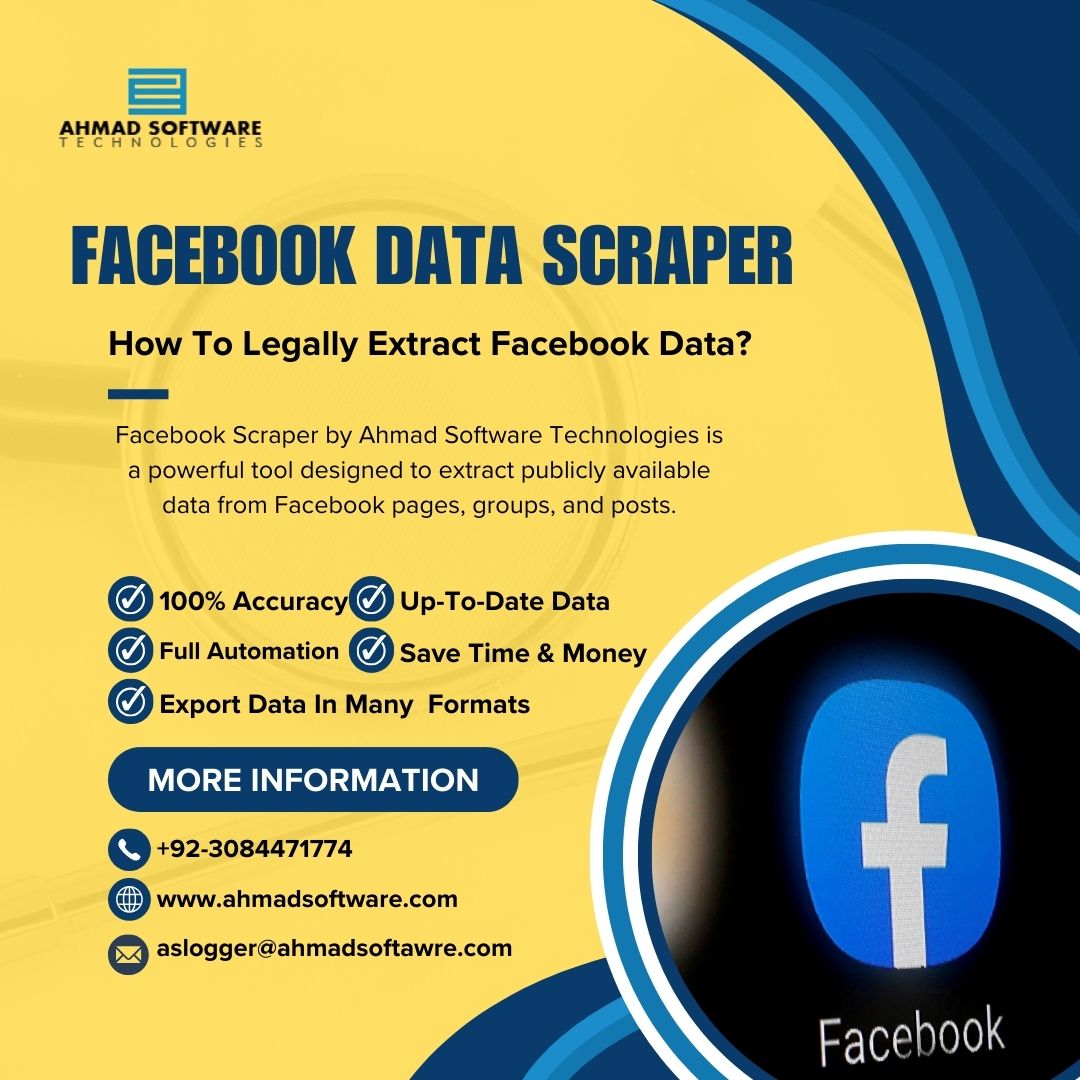
In a world driven by data, scraping information from social media platforms like Facebook has become a go-to strategy for businesses, researchers, and marketers. Facebook, with its vast repository of public data, offers immense opportunities for insights into user behavior, trends, and opinions. However, scraping data from Facebook comes with responsibilities, including compliance with legal and ethical guidelines. This article explores the dos and don’ts of Facebook scraping and highlights tools like Facebook Data Extractor to make the process efficient and ethical.
Understanding Facebook Scraping
Facebook scraping involves using tools or scripts to automatically collect publicly available data from Facebook profiles, pages, groups, and posts. This data can include:
- Posts and comments.
- Engagement metrics such as likes, shares, and reactions.
- Public profile information like names and locations.
Scraping Facebook data allows organizations to derive valuable insights, whether it’s for market research, sentiment analysis, or content optimization. However, understanding the boundaries between acceptable practices and violations is critical.
The Benefits of Facebook Scraping
When performed responsibly, Facebook scraping offers several benefits:
- Market Insights: Businesses can analyze customer preferences, feedback, and engagement trends to improve products and services.
- Competitor Analysis: Scraping public data from competitor pages helps identify successful strategies and gaps in the market.
- Trend Identification: Discovering popular posts, hashtags, and discussions allows organizations to stay ahead of industry trends.
- Sentiment Analysis: Analyzing public comments and posts helps gauge public opinion on specific topics or brands.
The Role of Facebook Data Extractor
One of the leading tools for scraping Facebook data is the Facebook Data Extractor. Designed for ease of use and efficiency, this tool automates the data collection process while offering features to target specific types of information.
Features of Facebook Data Extractor
- Customizable Filters: Extract data based on keywords, date ranges, or engagement metrics.
- Scalable Operations: Handle large-scale data scraping for extensive research or business needs.
- User-Friendly Interface: Simplifies the process, making it accessible even for non-technical users.
- Secure Data Export: Provides output in formats like CSV or JSON for easy analysis.
How to Use Facebook Data Extractor?
- Setup: Install the tool and configure it for your specific requirements.
- Target Selection: Enter the URL of the Facebook page, group, or profile you want to scrape.
- Filter Application: Apply filters to focus on relevant data, such as posts with a specific keyword or engagement threshold.
- Data Collection: Run the scraper to collect and store the data securely.
- Analysis: Use data analysis tools like Excel or Tableau to generate actionable insights.
The Dos of Facebook Scraping
To ensure compliance with ethical and legal standards, follow these best practices:
- Scrape Public Data Only
Restrict your scraping activities to publicly accessible data. Avoid accessing private information or data protected by privacy settings. - Comply with Facebook’s Terms of Service
Before starting, familiarize yourself with Facebook’s terms of service. Use tools like Facebook Leads Extractor that adhere to these guidelines. - Be Transparent
If using scraped data for research or business purposes, disclose your methods to stakeholders. Transparency builds trust and credibility. - Limit Data Volume
Scrape only the data you need to avoid unnecessary server strain and ensure compliance with Facebook’s policies. - Secure Data Properly
Store scraped data securely and protect it from unauthorized access. This is particularly important for sensitive or large-scale datasets.
The Don’ts of Facebook Scraping
To avoid legal and ethical pitfalls, steer clear of the following practices:
- Avoid Scraping Private Data
Accessing private information, such as data behind login screens or restricted group content, violates privacy laws and Facebook’s terms. - Don’t Use Scraped Data for Malicious Purposes
Using scraped data for spamming, harassment, or fraudulent activities can lead to severe legal consequences. - Steer Clear of Over-Scraping
Excessive scraping can lead to IP bans, account suspension, or legal notices from Facebook. Always operate within reasonable limits. - Don’t Ignore Regional Laws
Data scraping laws vary by country. Ensure that your activities comply with the relevant regulations, such as GDPR in the EU or CCPA in California. - Avoid Reselling Data
Selling scraped data without permission violates intellectual property laws and user trust.
Challenges in Facebook Scraping
While tools like Facebook Email Extractor simplify scraping, challenges remain:
- Platform Restrictions: Facebook’s algorithms can block scraping activities, especially at high volumes.
- Data Accuracy: Filters must be carefully applied to ensure the relevance of extracted data.
- Evolving Policies: Facebook frequently updates its terms and API access rules, requiring tools and practices to adapt.
Overcoming these challenges requires vigilance and a commitment to ethical practices.
Conclusion
Facebook scraping, when done responsibly, is a powerful tool for unlocking insights from one of the largest social media platforms in the world. Tools like Facebook Data Extractor make the process efficient and accessible, empowering businesses, researchers, and marketers to gather meaningful data while staying within ethical and legal boundaries.
By following the dos and don’ts outlined in this guide, you can leverage Facebook scraping to make informed decisions, optimize strategies, and stay ahead in today’s data-driven landscape. As with any data collection method, prioritizing transparency, compliance, and user privacy is essential to success.